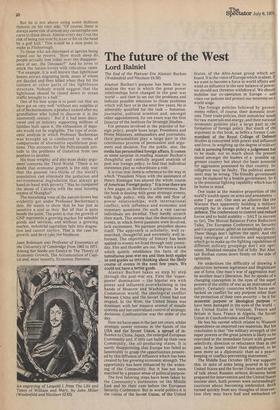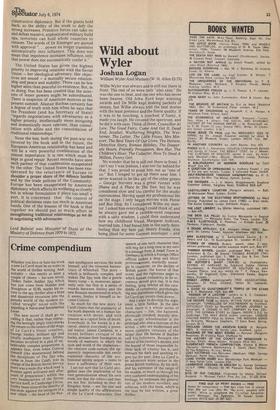The future of the West
Lord Balniel
The End of the Postwar Era Alastair Buchan (Weidenfeld and Nicolson £4.50) Alastair Buchan's purpose has been first to analyse the way in which the great power relationships have changed in the post war world — and then to set out the problems and indicate possible solutions to those problems which will face us in the next few years. He is admirably qualified for the task — historian, journalist, political scientist and, amongst other appointments, for ten years was the first Director of the Institute for Strategic Studies.
For persons involved in the practice of foreign policy, people loom large. Presidents and Prime Ministers, ambassadors and journalists, their personalities play a large part in the continuous process of persuasion and argument and decision. For the public, also, the media has personalised foreign affairs. It comes as some surprise in reading Alastair Buchan's thoughtful and carefully argued analysis of post war foreign policy, to find that individual statesmen play so subordinate a role.
It is true that there is reference to the way in which "President Nixon with the assistance of Henry Kissinger has altered the whole course of American Foreign policy." It is true there are a few pages on Brezhnev's achievements. But the book is dealing with great strategic events; with high policy; with the ebb and flow of power relationships; with international conflict; with influence and economic and monetary questions. On such a vast canvas individuals are dwarfed. They hardly scratch their mark. This means that the descriptions of events, in which fierce passions were involved, lack excitement. No partisan prejudice shows itself. The approach is scholarly, well researched, thoughtful and extremely well informed. The objectivity of history has been applied to events we lived through only yesterday. Fire and thunder are out. We have a book which quietly establishes the facts of the tumultuous post-war era and then both equips us and guides us into thinking about the likely course of events in the next few years. We could not have a better guide.
Alastair Buchan takes us step by step through the post-war era. First the 'superpower' domination — the bipolar era with power and influence overwhelming in the hands of Moscow and Washington. In the Communist world, the ideological conflict between China and the Soviet Union had not erupted. In the West, the United States was dominant with her massive arsenal of missile systems and her centralised control of strategic decisions. Confrontation was the order of the day.
Now we have seen in the last ten years, whilst strategic no),ver remains in the hands of the USA and the Soviet Union, a spread of influence to China, Japan, the enlarged European Community and, if they can build up their own Community, the oil-producing states. It is. surely disappointing that Europe has failed so lamentably to grasp the opportunities presented by this diffusion of influence which has been created by her growing economic strength. The opportunity has been enhanced by the widening of the Community. But it has not been matched by a greater sense of political purpose.
The first faltering steps have been taken by the Community's statements on the Middle East and by their case before the European Security Conference. But in world politics it is the voices of the Soviet Union, of the United States, of the Afro-Asian group which are heard. It is the voice of Europe which is silent. If we want to become a force in world affairs and wield an influence in the new balance of power. we should not threaten withdrawal. We should mobilise our co-operation in Europe — and voice our policies and protect our interests on a world stage.
The foreign policies followed by governments reflect, of course, their domestic inter ests. Their trade policies, their industries' needs for raw materials and energy, and their national economic policies play a large part in _the formation of foreign policy. But much of the argument in this book, as befits a former Commandant of the Royal College of Defence Studies is concerned with power and influence and force. In weighing up the degree of military risk in pursuing foreign policy a judgement has to be made, not so much about the present mood amongst the leaders of a possible aggressor country but about the basic potential for aggression possessed by that country. In telligence may be faulty. The political assessment may be wrong. The friendly government may be replaced by a hostile government. So it is the potential fighting capability which has to be borne in mind.
One looks at the massive proportion of the world's wealth spent on arms and armaments — some 7 per cent. One sees an alliance like the Warsaw Pact apparently building a military strength far in excess of what is needed for defence. The conferences to control and reduce forces and to build stability — SALT (a success so far), The Mutual Balances Force Reduction Talks, The European Conference on Security and Co-operation, grind on exceedingly slowly. These things don't lighten the spirit. And the long catalogue of missiles and equipment which go to make up the fighting capabilities of different military groupings don't stir opti
mism. Mankind remains full of folly. But Alastair Buchan comes down firmly on the side of optimism.
He underlines the difficulty of drawing a distinction between legitimate and illegitimate use of force. One man's war of aggression may be another man's liberation. But he speaks of a changing conception in the eyes of the super powers of the utility of war as an instrument of policy. Certainly countries which have embarked on conflict for any purpose other than the protection of their own security — be it for economic purpose or ideological purpose -have been damaged in the eyes of the world — the United States in Vietnam, France and Britain in Suez, France in Algeria, the Soviet Union in Czechoslovakia and Hungary.
He has his caveat which relates to Western dependence on imported raw materials. But his
conclusion is that "the military strength of the super powers or the great powers is likely to be. exercisedin the immediate future with greater selectivity, direction or reluctance than in the past, to be latent rather than deployed, to be seen more as a diplomatic than as a peacekeeping or conflict-preventing instrument." The Middle East October 1973 war supports this. In spite of arms being poured in by the United States and the Soviet Union and in spite of talk about Russian airborn divisions being prepared for intervention and the United States nuclear alert, both powers were outstandingly cautious about becoming embroiled. Both turned quickly from any thoughts of intervention they may have had and embarked on
constructive diplomacy. But if the giants hold back, so the ability of the weak to defy the strong increases. Primitive forces can take on and defeat massive, sophisticated military build ups, terrorists can hold whole countries to ransom. The words of Dr Kissinger are quoted with approval ". .. power no longer translates automatically into influence. This does not mean that impotence increases influence, only that power does not automatically confer it."
The United States has given the highest priority to improving relations with the Soviet Union — her ideological adversary. Her objectives are sound — a mutually secure relationship and peace and stability. There can be few higher aims than peaceful co-existence. But, in So doing, fear has been created that the interests of lesser powers might be subordinated. There is suspicion of American motives at the present summit. Alastair Buchan certainly has a degree of truth with him when he says that the President (and his Secretary of State) "regards negotiations with adversaries as a higher priority, intellectually more intriguing and domestically more relevant, than consultation with allies and the consolidation of traditional relationships."
None the less, both during the post-war era covered by the book and in the future, the European-American relationship has been and Will be a very powerful combination of the utmost importance. It is one which must be kept in good repair. Recent months have seen each partner of that combination exasperated by the other. The United States has been exasperated by the reluctance of Europe to shoulder a proper share of the defence burden and by the trade policies of the Community. Europe has been exasperated by American diplomacy which affects its wellbeing so closely
• but in whose formulation it plays too small a part. It is concerned that the control of political decisions rests too much in American hands. One of the lessons of the book is that together we should put as much effort in strengthening traditional relationships as we do in negotiating with adversaries.
Lord Ba/niel was Minister of State at the Ministry of Defence from 1970 to 1972.



































 Previous page
Previous page